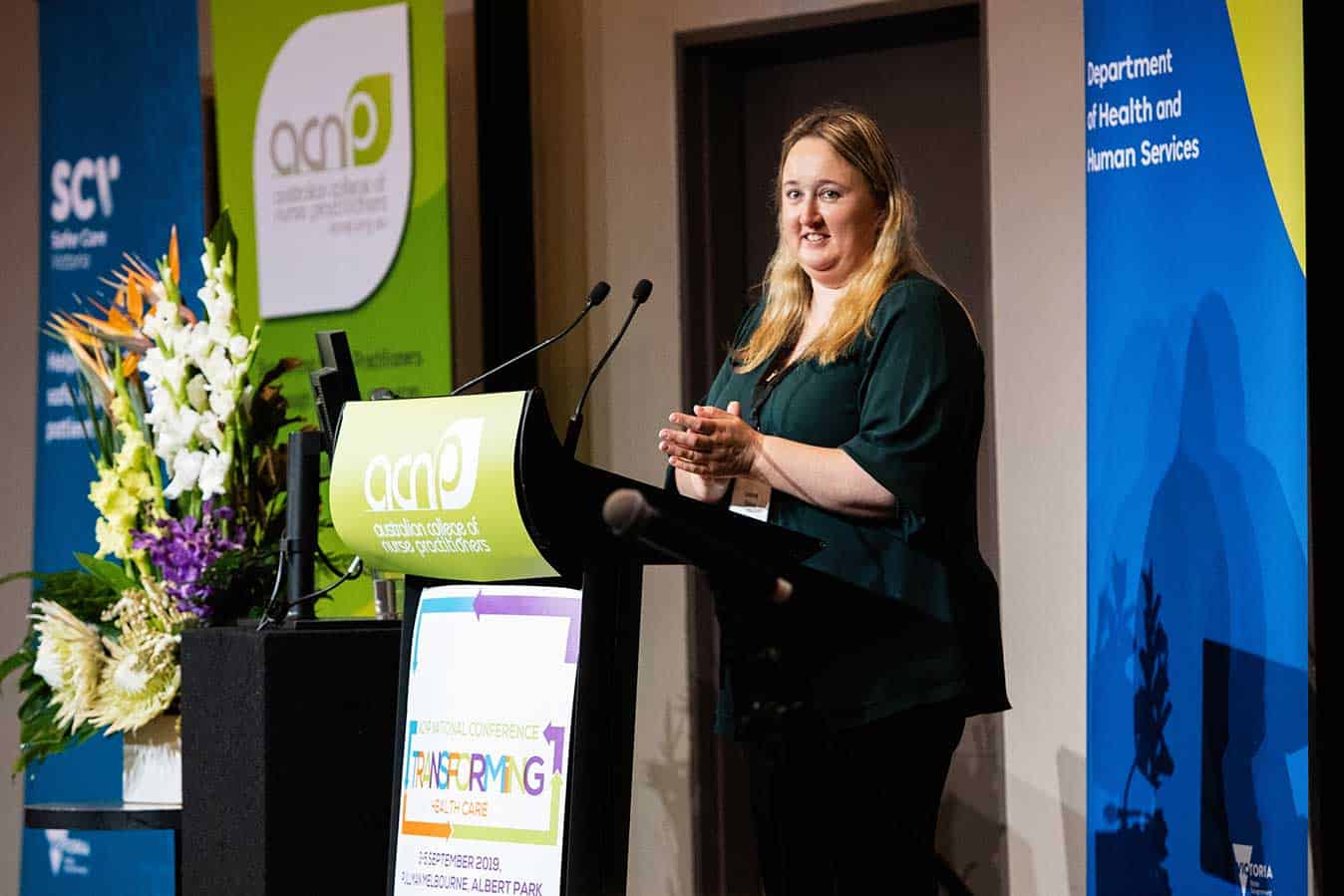The looming outcome of the contentious Medicare Benefits Schedule (MBS) Review has the potential to improve access to nurse practitioner services and healthcare for patients if recommendations to increase the scope of the advanced clinical role are adopted, Australian College of Nurse Practitioners (ACNP) President Leanne Boase has argued.
Addressing ACNP’s 2019 national conference, Transforming Health Care, in Melbourne this week, Ms Boase told hundreds of delegates that the MBS Review, pinpointed as the leading issue of concern in a recent member survey, had presented a rare opportunity to advocate for the nurse practitioner role and its health benefits.
However, Ms Boase stressed the MBS Review was not the only way forward for NPs and that any changes made would require ongoing management.
“We need to look at what education and what support we can provide to our members on MBS when we do get news or we do get the outcome. How are we going to work on supporting you to implement those changes,” Ms Boase said.
The MBS Review Taskforce has been considering how more than 5,700 items on the MBS, a list of health professional services such as consultations and diagnostic tests subsidised by the federal government, can be better aligned with contemporary clinical evidence and practice to improve health outcomes for patients.
The Taskforce is due to release its final recommendations to the government in coming months.
As part of the MBS Review, the Nurse Practitioner Reference Group (NPRG) released a report last year outlining 14 recommendations on Medicare items relating to nurse practitioners.
The NPRG’s recommendations focus on key areas that would enable greater access to care for those living in aged care or rural and remote areas, better preventative care and early intervention in disease management and nurse practitioners being integrated further into primary care.
The recommendations also back allowing nurse practitioners to work to their full scope, especially in communities which lack access to health services, reducing fragmentation of care and encouraging collaboration among health professionals such as doctors, and removing barriers to practice that currently limit access to NP services.
Ms Boase told delegates she had met with numerous MPs over the past year as the MBS Review had unfolded and that support and a greater understanding of the NP role was building.

“Quite a few times I’ve got ‘How are you going to guarantee that if you get these recommendations through you’re not going to start over-servicing?’. So we need to be ready to deal with these difficult questions.
“The good news is there’s evidence. It’s getting through. People are listening and it’s that positive and consistent approach that’s getting through.”
Speaking to the ANMJ at the conference, Ms Boase said ACNP was eagerly anticipating the outcome of the MBS Review and the opportunities it could bring.
“MBS is a fantastic thing for patients and communities because they’ll be able to see nurse practitioners for a much wider range of problems and it will also assist nurse practitioners having more of a care coordination role and ongoing relationships where patients are looked after and referred to appropriate specialists and health practitioners.”
If the NPRG’s recommendations are adopted, Ms Boase said access to health services would be boosted and that more nurse practitioners would be able to work in areas such as aged care.
“The recommendations will increase the value of the time-based consultations that we currently have. So the patients will get more [money] back. Currently, they’re not getting a great rebate on the service. It will also add after-hours, aged item numbers, which will enable nurse practitioners to go into aged care and deliver services, but also deliver services to people in their home where suitable.”
Emerging themes at this year’s ACNP conference included advocacy for change and improving the visibility and voice of nurse practitioners.
Next year’s 2020 Year of the Nurse and Midwife will place the professions in the spotlight but it also marks 20 years since the first nurse practitioner was endorsed in Australia.
The college, which considers itself an organisation that advocates not just for the nurse practitioner role and its members but also for better healthcare, is hopeful that NP numbers will reach 2,000 by next year.
“We really provide comprehensive healthcare to people and that’s to the whole person,” Ms Boase said of the NP role.
“For me, the fundamental standout of a nurse practitioner is that a person will come in as a patient; they don’t come in as a problem.”
Asked where she sees the future of the NP role heading over the next five to 10 years, Ms Boase said the outlook was positive and that NPs working to their full scope of practice could achieve significant outcomes.
“What we want, and what we’ll be aiming for is that we’re just a seamless part of the health systems so we are a viable, accessible option for patients. That we’re complementing other health professionals, including the medical profession, and working together for a common goal.
“That there’s no more questions about what are you and what do you do because what we do speaks for itself. The ultimate question is can you see a nurse practitioner and get safe, quality healthcare. The question is not what are you, it’s what can you deliver and I think that’s where we need focus and I hope in five or 10 years that we’re not answering these questions.”








